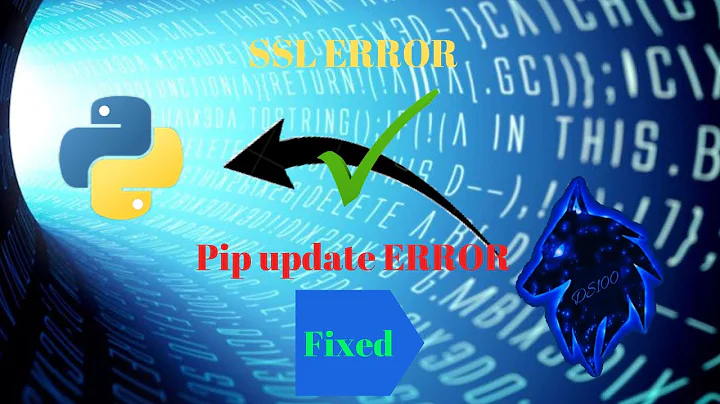Building Python 3.7.1 - SSL module failed
Solution 1
I solved it after 3 days only because of this blog. with python 3.7.4 openssl 1.1.0 centOS 6.
here is the summary :
First, some prerequisites:
sudo apt-get install build-essential checkinstall libreadline-gplv2-dev libncursesw5-dev libsqlite3-dev tk-dev libgdbm-dev libc6-dev libbz2-dev
use yum instead of apt-get if using centos linux.
Install ssl 1.0.2 or higher.
cd /usr/src
curl https://www.openssl.org/source/openssl-1.0.2o.tar.gz | tar xz
cd openssl-1.0.2o
./config shared --prefix=/usr/local/
sudo make
sudo make install
We will need to pass /usr/src/openssl-1.0.2o into the Python configure script.
mkdir lib
cp ./*.{so,so.1.0.0,a,pc} ./lib
Now proceed with installing Python:
cd /usr/src
sudo wget https://www.python.org/ftp/python/3.7.0/Python-3.7.0.tgz
sudo tar xzf Python-3.7.0.tgz
cd Python-3.7.0
./configure --with-openssl=/usr/src/openssl-1.0.2o --enable-optimizations
sudo make
sudo make altinstall
To test it out, run python3.7 and input:
import ssl
ssl.OPENSSL_VERSION
Hope it helps!
Solution 2
Compiling openssl
Download your openssl tarball, unzip, and then ensure that the install directory is named
openssl.
I placed mine in /usr/local/openssl, so I'll use that in my example.
-
sudo mv openssl-1.0.2u /usr/local/openssl && cd /usr/local/openssl -
sudo make distclean -
sudo ./config -fPIC -shared -
sudo make && sudo install
Now, add the openssl shared library to your PATH.
vim ~/.profile Go export LD_LIBRARY_PATH="/usr/local/openssl/lib:$LD_LIBRARY_PATH" :wq
Compiling Python3
The key here is understanding that the path you define with
--with-openssl=is where Python looks for /openssl/lib. You need to give Python the parent directory of the openssl directory.
That means that if you set
--with-openssl=/usr/local/opensslyourmake installwill fail even though themakelogs show that openssl is fine!
--enable-optimizationsis irrelevant but recommended - longer make for 10% faster Python code is a good tradeoff.
--prefix=is merely where I'd like python3 to install, if you didn't know.
sudo make distclean
Edit your python setup file
vim /{yourpythonsource}/Modules/Setup
Uncomment out the following lines and ensure that your SSL variable points to your openssl directory. In mine, it was looking for the directory 'ssl' instead of 'openssl.'
<pre><code># Socket module helper for SSL support; you must comment out the other </code>
<pre><code># socket line above, and possibly edit the SSL variable: </code>
<code>SSL=/usr/local/openssl
_ssl _ssl.c \
-DUSE_SSL -I$(SSL)/include -I$(SSL)/include/openssl \
-L$(SSL)/lib -lssl -lcrypto</code>
-
sudo ./configure --with-openssl=/usr/local --prefix=/opt/python-3.7.1 -
sudo make && sudo make install
Solution 3
While this might not be the best answer, I will share how I solved this problem.
First of all, in my case, OpenSSL did not build correctly, as
make testdid return errors (and consequently Python gave this error). This was solved by installing a newer version of Perl and then installing OpenSSL again (configure, make, etc).-
Use this command before using ./configure
export LD_LIBRARY_PATH=/path/to/openssl/lib:$LD_LIBRARY_PATH
-
At the configure command, include the library:
LDFLAGS="-L/path/to/openssl/lib" ./configure (all your preferred options) --with-openssl=/path/to/openssl
as apparently the option for configure does not convey the message to the C compiler which needs it.
Am not sure whether option 2 and 3 are needed simultaneously, but I did so and it worked.
Solution 4
On CentOS / Linux 2 if you install openssl using
sudo yum install -y openssl-devel
then the library is installed to /usr/local/lib64, and you can configure Python as follows:
./configure --enable-shared --with-openssl=/usr/local/lib64
there are step-by-step instructions here: How to Install Latest (2020) Django to AWS EC2 Linux 2 Instance and Serve w/ Apache Hello World
Solution 5
Edit setup.py
Find the following lines:
system_lib_dirs = ['/lib64', '/usr/lib64', '/lib', '/usr/lib']
system_include_dirs = ['/usr/include']
...and place each folder at the beginning of its respective list.
In my case I had to add: /usr/local/lib and /usr/local/include:
system_lib_dirs = ['/usr/local/lib', '/lib64', '/usr/lib64', '/lib', '/usr/lib']
system_include_dirs = ['/usr/local/include', '/usr/include']
Finally: make distclean && ./configure
You may want to ensure that export LD_LIBRARY_PATH=/usr/local/lib:$LD_LIBRARY_PATH (or what have you) is added to the very end of /etc/profile and reboot, as well.
Related videos on Youtube
mcatis
Updated on May 01, 2022Comments
-
mcatis about 2 years
Building Python 3.7 from source runs into following error:
Failed to build these modules: _hashlib _ssl Could not build the ssl module! Python requires an OpenSSL 1.0.2 or 1.1 compatible libssl with X509_VERIFY_PARAM_set1_host(). LibreSSL 2.6.4 and earlier do not provide the necessary APIs, https://github.com/libressl-portable/portable/issues/381I tried so many workarounds from other stackoverflow-questions, but it doesnt work. I build newest OpenSSL and LibreSSL from source. OpenSSL path is: "/usr/local/ssl" with version OpenSSL 1.0.2p.
./configure --with-openssl=/usr/local/ssl/ (./configure CPPFLAGS="-I/usr/local/ssl/include" LDFLAGS="-L/usr/local/ssl/lib") make make altinstallMy system: Ubuntu 12.04.5 LTS
Any ideas?
-
 mvp about 5 yearsYour Ubuntu version looks extremely old. Consider upgrading to 18.04 LTS, it will make many issues like this to simply disappear.
mvp about 5 yearsYour Ubuntu version looks extremely old. Consider upgrading to 18.04 LTS, it will make many issues like this to simply disappear. -
 Sunil Kumar over 4 yearsPossible duplicate of ImportError: No module named _ssl
Sunil Kumar over 4 yearsPossible duplicate of ImportError: No module named _ssl
-
-
w08r over 4 yearsThe brew reinstall was the only thing that worked in my context, thank you!
-
 Brad Solomon over 4 yearsYou should not need
Brad Solomon over 4 yearsYou should not needbrew link openssl --force. It is dangerous and Brew does not symlink openssl for a good reason: "[email protected] is keg-only, which means it was not symlinked into /usr/local, because openssl/libressl is provided by macOS so don't link an incompatible version." -
blissweb almost 4 yearsVery useful getting the openssl from source. I had to make one change, setting the export LD_LIBRARY_PATH=/usr/src/openssl-1.0.2o/lib before running the configure command. This was Ubuntu 14 with Python 3.8.2. Working, yay !
-
 dmgl almost 4 yearsThank you. Without edit
dmgl almost 4 yearsThank you. Without editvim /{yourpythonsource}/Modules/Setupas you advised i could'nt build python3.8 for raspberry pi 3 "Raspbian GNU/Linux 8 (jessie)" -
Pavel Chernikov almost 4 yearsWhy do you need to add ssl shared library to PATH? Did you mean to add it to LD_LIBRARY_PATH?
-
Xidh almost 3 yearsOnly worked after export LD_LIBRARY as @blissweb mentioned above! Using Debian 8
-
Soid over 2 yearsWork for me after tried a few other answers. I just didn't use the lib folder in openssl (e.g. just LDFLAGS="-L/path/to/openssl")
-
Mavaddat Javid over 2 yearsNice one. Your advice solved my SSL problem on
library/amazonlinux:latestDocker image.yum install -y openssl-devel./configure --enable-shared --with-openssl=/usr/local/lib64 --enable-optimizations -
Mavaddat Javid over 2 yearsYes. I had to combine this
make distclean && ./configureadvice with that of @adam-winter above. Otherwise, gcc warns about "coverage_mismatch". -
Mavaddat Javid over 2 yearsFor me the build step for
opensslwasyum install -y tcl tcl-devel tk tk-develgit clone git://git.openssl.org/openssl.gitcd openssl/./config --prefix=/usr --openssldir=/etc/ssl --libdir=lib shared zlib-dynamic -Wl,-rpath=/usr/local/ssl -Wl,--enable-new-dtagsas recommended in wiki.openssl Compilation and Installation ↪ Using RPATHs. -
 Tomasz Hławiczka over 2 yearsNow there is also this one:
Tomasz Hławiczka over 2 yearsNow there is also this one:yum install -y openssl11-devel-Python 3.10requiresOpenSSL 1.1.1or newer. -
 pfa about 2 yearsDidn't solve it for me. OpenSSL 1.1.1n 15 Mar 2022 (Library: OpenSSL 1.1.1k FIPS 25 Mar 2021) Could not build the ssl module! Python requires a OpenSSL 1.1.1 or newer
pfa about 2 yearsDidn't solve it for me. OpenSSL 1.1.1n 15 Mar 2022 (Library: OpenSSL 1.1.1k FIPS 25 Mar 2021) Could not build the ssl module! Python requires a OpenSSL 1.1.1 or newer -
 pfa about 2 yearsDitto for me on LD_LIBRARY_PATH
pfa about 2 yearsDitto for me on LD_LIBRARY_PATH -
 nori about 2 yearsVery late response, but you're right, I shouldn't have added a ../lib to the $PATH.
nori about 2 yearsVery late response, but you're right, I shouldn't have added a ../lib to the $PATH. -
anshuk_pal about 2 years@TomaszHławiczka stackoverflow.com/questions/71951779/… I could not manage to have it built from 3.10 Can you please let me know, where I am going wrong






